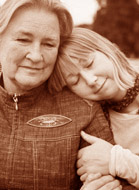HOW TOBE AN EFFECTIVE CAREGIVER Information and Support for Caregivers by The American Cancer Society Caregiving is the most important and challenging job an individual will ever have. Below are some steps that individuals can take to be effective caregivers. Work and communicate effectively with the patient. Caregivers care for patients who must deal with the physical effects of the disease and medicine, as well as the psychological and social challenges of living with cancer. Support for the cancer patient includes efforts to: • Create a climate that encourages and supports sharing feelings.
Work with family and friends. Caregivers should not try to do everything themselves. They should ask for help. Others may want to help but need to be told how. It is important to be clear with these helpers about what they could do to be helpful, as well as the limits of what is expected of them. Friends and family can go grocery shopping, pick up children at school, etc. Take care of your own needs and feelings. Caregivers need to be at their best if they are to provide the best care. Caregivers must pay attention to their own needs as well as those of the person they are helping if they are to be effective. Caregivers should set limits on what can be reasonably expected of them. They should take time off to care for themselves and ask for help before stress builds. • Try not to make important decisions while upset. For information on these programs in your area, call the American Cancer Society at 1-800- ACS-2345 or visit their Web site at www.cancer.org |
|
Caregiving? |
|
More resources and articles for caregivers |
|
. If you’re assisting a relative or friend over 60 or, you’re over 60 yourself and are the primary caregiver for a relative under 18. Either way, You don’t have to go it alone. The AIS Family Caregiver Support Program is at your side, and on your side. We can help you find the resources you need for training, assistance, support, assessment, and legal services. Call 1-800-510-2020 |
|
Community Resources |
|
THE CARING COMMUNITY – Living with Cancer (CCLC) offers WEEKLY support groups for those affected by any type of cancer. Whether you are newly diagnosed, you are undergoing treatment, or you have completed your treatment and are ready to deal with the emotional impact of a cancer diagnosis, you may want to join a cancer support group. Groups are also available for family members living with a loved one affected by cancer. English support groups are offered countywide.To register for a CCLC group, please call our bilingual line at (619) 682-2663 If you are in need of other services, such as health insurance, financial assistance, transportation, information on a specific type of cancer, clinical trials, medical equipment or prosthesis, among other things, and/or need help navigating the cancer care system, please call San Diego County Cancer Navigator’s Help-Line at (866) 324-2628 or visit our website at www.cancernavigator.org
|
|
|
|
Bienvenido a la primer revista dedicada al cuidado de la salud
 info
info
The first, the best & the only English & Spanish Magazine in San Diego, California
| CANCER |
| Talking with Your Doctor About Cancer-related Pain |
| Cancer: What it Means to You |
| LUNG CANCER |
| Lung Cancer Awareness |
| BREAST CANCER |
| Early Detection Save Lifes |
| SKIN CANCER |
Why You Should Know About Melanoma ....Melanoma is the most serious of the common type of skin cancer. The good news is that most melanomas can be found early and treated successfully. This brochure describes risk factors for this type of skin cancer, and important tips for finding it early.(PDF) |
| .COLON CANCER |
Colorectal cancer screening saves lives. ..If everyone aged 50 years old or older were screened regularly, up to 60% of deaths from this cancer could be avoided. >> CDC |
| March is National Colorectal Cancer Awareness Month! CMS |
| Everyday Steps to Reduce Colon Cancer Risk |
| Colorectal Cancer Testing on the Rise |
| Prevention the Focus of New Colon Cancer Screening Guidelines |
| CAREGIVING |
| How To Be an Effective Caregiver >> |



